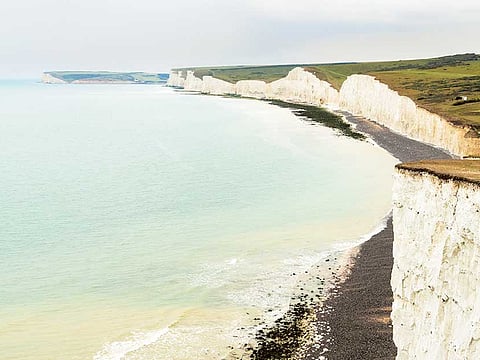Sea swallowing White Cliffs of Dover
The sea is swallowing the White Cliffs of Dover at faster rates, thanks to thinned beachfronts

London: The White Cliffs of Dover, those brilliant mineral deposits along the southern coast of Britain, are eroding. And in the past 150 years they have beat a retreat nearly 10 times hastier than they did in the previous 7,000.
The reason, researchers say, is a thinning of the beachfront separating the 90-million-year-old bluffs and the sea.
That’s the conclusion reached by a team of geologists and earth scientists from the US and Britain, who measured the cliff erosion by tracking chemical signatures in marine sediment. Writing in the journal ‘Proceedings of the National Academy of Sciences’, the scientists calculated that over the past few centuries the English Channel has eaten away at the cliffs at a rate of 8.7 inches to just over a foot inland annually. Thousands of years ago, that rate was three-quarters of an inch to 2.3 inches per year.
What has caused the beach to thin over the past 150 years may be a mixture of more powerful storms coupled with — you might have guessed it — human activity. Human modification of the coastline meant, in some sections, there was a smaller beach buffer between the waves and the bluffs.
“The gravels of the beaches of the south coast were much-prized materials for a whole range of construction activities and were extracted in massive amounts over long periods,” University of Dundee geoscientist Rob Duck, who was not involved with the study, told the Guardian.
“This has certainly aggravated the problems of erosion on the south coast of England and it will only get worse as relative sea level and storminess increase due to climate change.”
The scientists measured the erosion rates with the help of a radioactive isotope called beryllium-10, which forms when cosmic radiation hits quartz in the rock. If concentrations of beryllium-10 are low, that means the rock has been more freshly exposed to the rays. Researchers could compare rocks on the bluffs to rock on the beach to submerged rock, retrieved at low tide, and calculate erosion speeds.
It was not the only observation that the chalk edge of Dover has been crumbling faster than before. Fifteen years ago there was a turn-of-the-century spike in rockfalls and heavier, eroding rains.
Though those who have built their homes near the cliffs may have cause for concern in the coming decades, the cliffs are themselves not about to vanish. “We’ve probably got tens of thousands of years left,” UK National Trust environmentalist Steven Judd said at the time.



